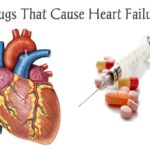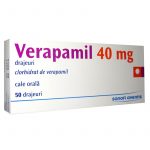List of Drugs That Cause QT Prolongation or Irregular Heart Rhythm

Long QT syndrome (LQTS) is a condition in which repolarization of the heart after a heartbeat is affected. It results in an increased risk of an irregular heartbeat which can result in fainting, drowning, seizures, or sudden death. These episodes can be triggered by exercise or stress.
The length of a normal QT interval varies by age and sex.
For males and females below 15 years of age:
- Normal QT interval: 0.35–0.44 seconds
- Borderline QT interval: 0.44–0.46 seconds
- Prolonged QT interval: More than 0.46 seconds
For adult males:
- Normal QT interval: 0.35–0.43 seconds
- Borderline QT interval: 0.43–0.45 seconds
- Prolonged QT interval: More than 0.45 seconds
For adult females:
- Normal QT interval: 0.35–0.45 seconds
- Borderline QT interval: 0.45–0.47 seconds
- Prolonged QT interval: More than 0.47 seconds
Some people are born with a genetic mutation that causes long QT syndrome (congenital long QT syndrome). Long QT syndrome may be caused by certain medications, mineral imbalances, or medical conditions (acquired long QT syndrome).
The following things may increase your risk of developing congenital or acquired long QT syndrome or its symptoms:
- A history of cardiac arrest
- Having a first-degree relative (parent, sibling) with long QT syndrome
- Using medications known to cause prolonged QT intervals
- Being female and on heart medication
- Excessive vomiting or diarrhea
- Eating disorders, such as anorexia nervosa, which cause electrolyte imbalances
Sexual intercourse doesn’t appear to be a high risk for patients with long QT syndrome. Pregnancy and delivery aren’t associated with an increased risk of symptoms in women diagnosed with long QT syndrome. However, if you have the condition and are pregnant, your doctor will want to carefully monitor you during and after pregnancy.
Drugs that can cause QT prolongation or irregular heart rhythm?
The following drugs can cause QT prolongation or irregular heart rhythm;
Antiarrhythmic agents
• Class IA
o Class IA antiarrhythmic drugs work by blocking sodium and potassium channels. Blocking sodium channels tends to shorten the action potential duration while blocking potassium channels prolongs the action potential. When the drug concentration is at a low to normal concentration, the potassium channel blocking activity takes precedence over the sodium channel blocking activity
- Disopyramide
- Procainamide
- Propafenone
- Quinidine
Because of the predominance of the potassium blocking activity, Torsades de pointes (TdP) is seen more frequently with therapeutic levels of quinidine. Sodium blocking activity is dominant with subtherapeutic levels, which does not lead to QT prolongation and TdP.
• Class III
o Class III antiarrhythmic drugs are potassium channel blockers that cause QT prolongation and are associated with TdP.
Amiodarone works in many ways. It blocks sodium, potassium, and calcium channels, as well as alpha and beta-adrenergic receptors. Because of its multiple actions, amiodarone causes QT prolongation but TdP is rarely observed.
o Dofetilide
o Ibutilide
Ibutilide differs from other class III antiarrhythmic agents in that it activates the slow, delayed inward sodium channels rather than inhibiting outward potassium channels.
o Sotalol
Sotalol has beta-blocking activity. Approximately 2 to 7 percent of patients taking at least 320 mg/day experience proarrhythmia, most often in the form of TdP. The risks and effects are dose-dependent.
Psychiatric medications include antipsychotics and antidepressants that have been shown to lengthen the QT interval and induce TdP, especially when given intravenously or in higher concentrations.
• Typical antipsychotics
o Chlorpromazine
o Haloperidol
Haloperidol functions by blocking the KCNH2 channel, the same pathway that other drug-inducing LQTS block. Patients taking haloperidol are at a higher risk if they also have electrolyte abnormalities (such as hypokalemia and/or hypomagnesemia), congenital LQTS, cardiac abnormalities, hypothyroidism, or if they are concurrently taking other medications known to lengthen the QT interval.
o Thioridazine
• Atypical antipsychotics
o Quetiapine
Overdoses of quetiapine cause QT prolongation in patients with cardiac risks.
Mild QT prolongation can be caused by risperidone but there are no specific drug warnings associated with this.
o Ziprasidone
• SSRIs
o An ECG is recommended before patients are prescribed SSRI agents citalopram and escitalopram if the prescribed dose is above 40 mg or 20 mg per day, respectively.
o Paroxetine
• SNRIs
o Venlafaxine
• Tricyclic antidepressants
o Amitriptyline
o Desipramine
o Doxepin
o Imipramine
• Macrolides
o Clarithromycin
o Erythromycin
When taken independently, erythromycin has been shown to cause both QT prolongation and TdP. Erythromycin works by inhibiting the CYP3A protein. Patients who have low CYP3A activity and are also concurrently taking other medications such as disopyramide, which can lead to QT prolongation and TdP.
• Fluoroquinolones
o Levofloxacin
o Moxifloxacin
Other agents
• Chloroquine
• Cisapride
• Foscarnet
• Hydroxychloroquine
• Ketoconazole
• Octreotide
• Tacrolimus
• Tamoxifen
Long QT syndrome is treatable. You might need to avoid or take certain medications to prevent dangerous heartbeat episodes. Sometimes, treatment for long QT syndrome involves surgery or an implantable device.





